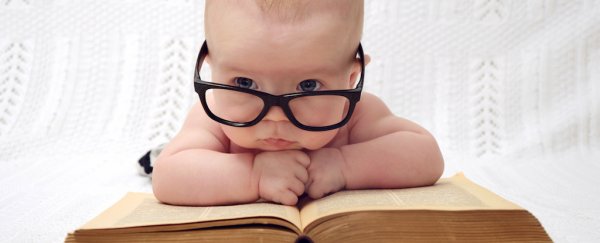New parenting books seem to pop up all the time. How to do it the French way, the Tiger Mom way, the New Kid by Friday way, or how to just muddle through – the choice can be a little overwhelming.
How can we know which guide will give us the answers to the questions that are most relevant to our needs, with an approach that we feel comfortable with?
I came across – and read – a vast selection while writing my own parenting book, Little kids, big dilemmas: Your parenting problems solved by science – and there really does seem to be a guide for everyone.
For my own contribution, I used a science-led, evidence-based approach. And while the selection for genuinely research-oriented parenting books is not particularly large, there are a few I would highly recommend.
So here are my top five parenting books to have within reach for help in navigating what are often those bewildering early years. What to read when you don't really have time to read:
1. Our favourite gift
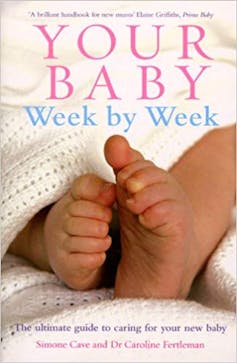
Your Baby Week by Week by Simone Cave and Dr Caroline Fertleman was the book I used for my own children. It was a gift to us and I have given it many times as a gift to others. The thing that's really great is that you can dip in and out as you like.
In those first few months when you're really exhausted and all you want is a response to the exact question you're looking for, this book provides specifics on questions such as how much milk, sleep and crying time your child needs.
The real essentials to caring for your baby.
2. Mum knows best
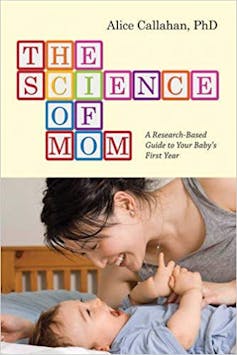
The Science of Mom: A Research-Based Guide to Your Baby's First Year by Alice Callahan takes a clear, nicely paced approach to talking the reader through the science on some of the most contentious parenting issues.
Particularly relevant to the author's American audience is the discussion on vaccination, which lays out the evidence in an accessible, no-nonsense fashion.
Callaghan also covers research on many of the areas parents care about most, such as feeding and sleeping.
3. Science for everyone
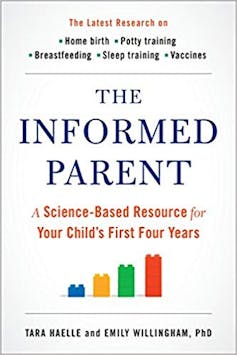
I really like The Informed Parent: A Science-Based Resource for Your Child's First Four Years by Tara Haelle and Emily Willingham. It's obvious the authors have plenty of experience communicating science to the lay reader.
Not only do they present the up-to-date knowledge on controversial topics, they also discuss this in relation to the personal choices they made when raising their own children.
They give just the right amount of personal anecdote, making the review of the research evidence easy to digest and the book overall an easy read. I also like that they address in detail the thorny topic of sleep training and controlled crying.
4. Focus on discipline
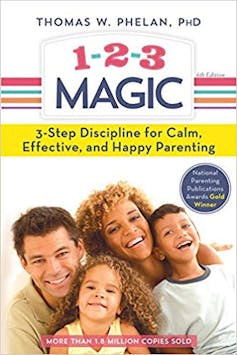
With 1.6m copies already sold, 1-2-3 Magic: 3 Step Discipline for Calm, Effective and Happy Parenting by Dr Thomas W. Phelan is the book on discipline and young children.
Phelan believes that all discipline situations can be sorted into two categories – the behaviours you want to start (such as tidying up or getting ready for school) and those you want to stop (such as whining, fighting or anything anti-social).
While it can sometimes can feel overly controlling, this book is full of clear practical advice. Parents are certain to find something useful to add to their disciplining repertories.
5. Talking it over
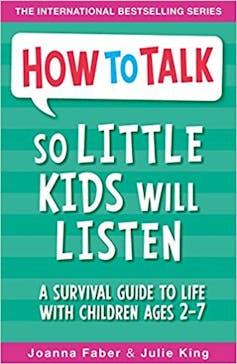
How To Talk So Little Kids Will Listen: A survival guide to life with children ages 2-7 by Joanna Faber and Julie King is part of the very popular series emanating from the original international bestseller – How to Talk So Kids Will Listen and Listen So Kids Will Talk.
![]() Through the use of practical examples, the authors illustrate the unhelpful communication patterns parents often fall into when dealing with their kids.
Through the use of practical examples, the authors illustrate the unhelpful communication patterns parents often fall into when dealing with their kids.
They also provide loads of story examples, which many parents will relate to, with examples of how to deal with them. There is something here for everyone.
Sarah Kuppen, Senior Lecturer in Developmental Psychology, Anglia Ruskin University
This article was originally published on The Conversation. Read the original article.
